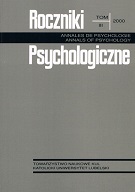Społeczne i sytuacyjne uwarunkowania zachowań altruistycznych. Przegląd badań
Social Situational Conditions of Altruistic Behaviours a Review of Researches
Author(s): Jacek ŚliwakSubject(s): Psychology
Published by: Towarzystwo Naukowe KUL & Katolicki Uniwersytet Lubelski Jana Pawła II
Summary/Abstract: The paper is a review of findings pertaining to the links between altruism and social and situational variables. Altruism is taken here to mean a person’s activity on behalf of other people, an activity that is beneficial for them, without expecting any rewards in return. The person who is helping should be aware of that, his or her action must be free and must be a value in itself for that person. The paper focuses our attention on the following social variables: the number of participants (observers) in some unlucky event; the fact whether the onlookers of the unlucky event know one another; observation of some charitable actions in the near past, rush, mood (transitory affective states), urbanization and age. Taking into account the number of people, it turned out that the presence of others may diminish motivation for giving help. Moreover, the greater number of observers makes it that the event is perceived as less dangerous. This observation allows psychologists to formulate the effect of the „diffusion of responsibility.” Another factor, on which attention has been focused, is that the time during which help is given depends on whether the observers of the unlucky event know one another. When the observers of some unlucky incident are strangers, it may diminish their readiness to bring help. Those who had the opportunity to observe in the near past some charities, charitable actions, are more likely to adopt altruistic attitudes. Still another factor which affects giving help is rush and the goal of that rush, the importance of the goal they are to accomplish. Another variable affecting the readiness to bring help is mood (transitory affective states). It has been noticed that a sad mood causes in children a reduction in altruistic activities, and in adults the opposite effects, ie. they become more ready to be altruists. Numerous researches on the influence of urbanization on the readiness to bring help have proved that inhabitants of villages and small towns are more altruistic than inhabitants of big towns. If it comes to sex, men are shown to be involved in other forms of help than women. The situations which demand courage, reflex and firmness are more specific of men, whereas women engage themselves to tasks related to concern, care and commitment.
Journal: Roczniki Psychologiczne
- Issue Year: 3/2000
- Issue No: 1
- Page Range: 35-47
- Page Count: 13
- Language: Polish

